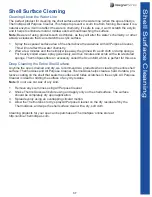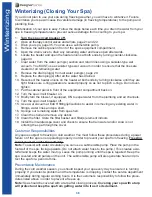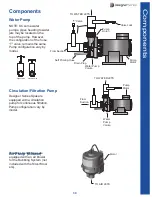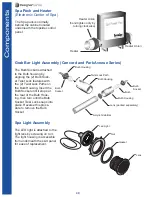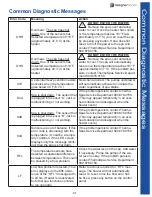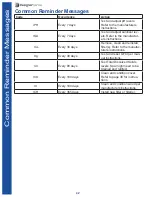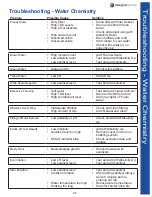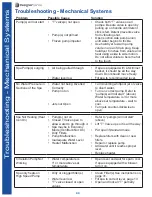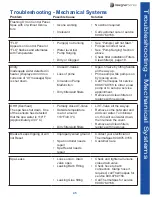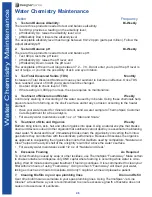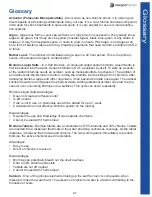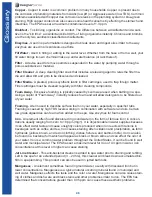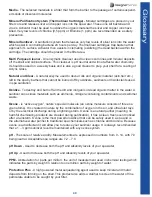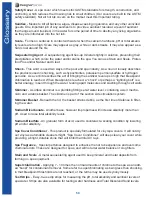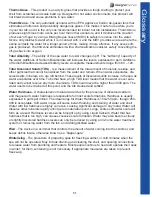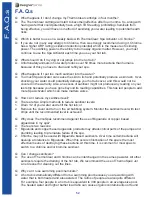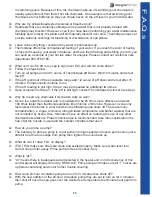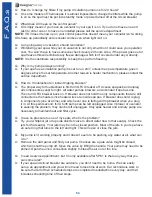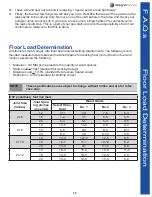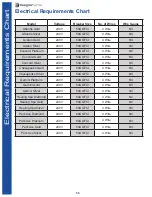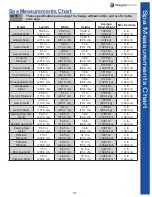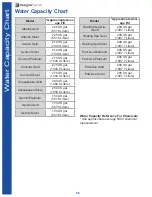
51
ThermoGloss
- This product is an acrylic gloss that provides a tough coating to protect your
shell from scratches and scale build up. Designed for hot water environments, this product will
not break down and cause problems in spa water.
ThermOzone
- The only automatic ozonator with an EPA approved, built-in de-gasser tank that
eliminates all offensive and potentially dangerous gases. This makes it safe to use while you’re
in your hot tub, and it is the only one recommended for indoor hot tub installations. ThermOzone
produces eight times more ozone per hour than other ozonators, and it minimizes the creation
of excess “off-gas” by using a Mixing Degas Vessel (MDV) to safely mix ozone into the water.
Ozone only disinfects water while it is in contact with it, and the MDV provides an area where the
ozone contacts the water for a longer period of time, making it more effective. If any excess off-
gas is produced, ThermOzone eliminates it with a charcoal/carbon canister, safely converting the
off-gas back into oxygen.
Total Alkalinity
- The ability of the spa water to resist changes in pH. The “buffering” capacity of
the water. Additions of Sodium Bicarbonate will increase the levels, expressed in ppm. Additions
of Sodium Bisulfate decrease Alkalinity levels. Acceptable measurements range from 80 – 120.
Total Dissolved Solids (TDS)
- Is a measurement of the total amount of minerals, residue, and
other particles that cannot be oxidized from the water and remain. When water evaporates, dis-
solved salts, minerals, etc. are left behind. These levels of dissolved solids increase in the spa as
water evaporates over time. Tubs that have a high TDS level means that the water is over satu-
rated and cannot receive any more chemicals. TDS should never be higher than 3000 ppm. The
water needs to be drained at this point, and the tub cleaned and refilled.
Water Hardness
- A characteristic of natural water due to the presence of dissolved calcium
and magnesium; water hardness is responsible for most scale formations. Hardness is usually
expressed in parts per million. The ideal range for Water Hardness is 100-250 ppm, though 250-
400 is acceptable. Soft water in spa will cause instant foaming and staining of water and shell.
Water with low hardness is highly corrosive, causing significant damage to any metal. Water will
dissolve other minerals rapidly until it gets to saturation point. Large, coarse soft-water scale will
form as a result. Hardness levels can be brought up by using Liquid Calcium. Water that has
hardness that is too high, can cause excessive scale formation. Water may also become cloudy
or slightly discolored hardness levels can only be reduced by using an in-home water treatment
system or removing water from the tub, and adding distilled water.
Weir
- The device in a skimmer that controls the amount of water coming into the skimmer, and
keeps debris inside, otherwise known as a “flapper-gate.”
Winterizing
- The procedure of preparing spas for freezing weather, in cold climates when the
spa will not be operated. May include draining and cleaning the shell, and opening connections
to release water from plumbing and heaters. Most people continue to heat and operate their spas
in winter; for them, winterizing is not necessary if appropriate measures are taken to prevent
freeze-up.
Glossary
Summary of Contents for Atlantis Gold
Page 1: ...ThermoSpas Designer Series Owner s Manual Safety Maintenance and Technical Information ...
Page 6: ......
Page 65: ......
Page 66: ......
Page 67: ......

